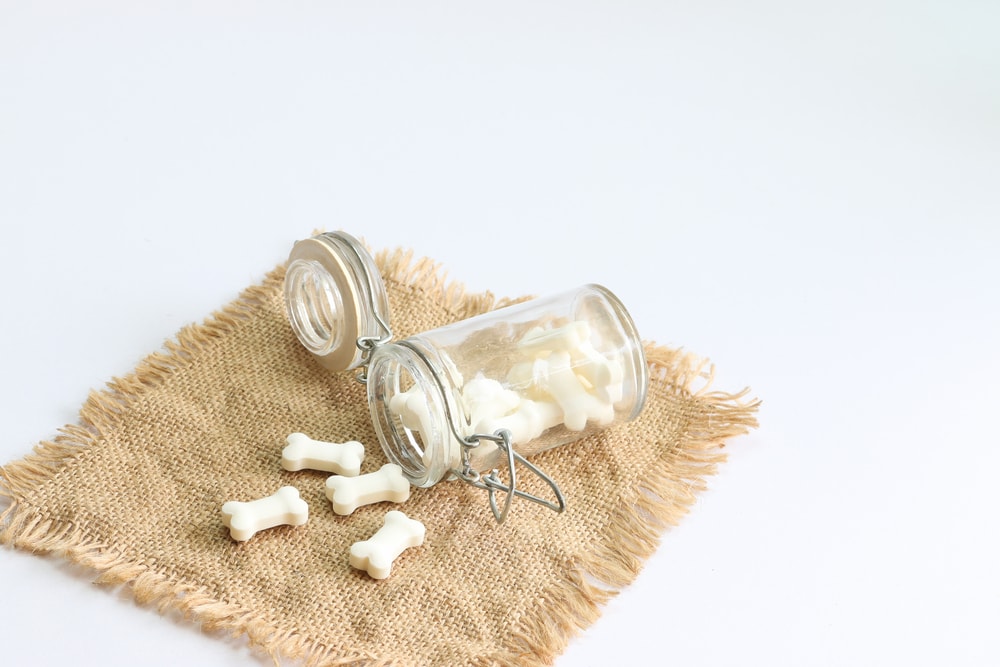Is It Safe to Give Calcium Meds to My Dog?

When you visit a pet clinic, you may see a row of calcium supplements being sold. You wonder what they are for, given that most of your vet’s patients are young, active dogs.
In fact, calcium tablets are now being widely given as a daily supplement to dogs. It is because surprisingly, many dogs are seen to be inadequate with this mineral. It may be because of the lack of calcium in many commercial pet foods, or the lack of information drive with calcium deficiency symptoms.
Calcium is essential for dogs because it sustains their bones, helps them metabolize vitamins and minerals, and keeps their immune system in check. Dogs with calcium deficiency are most likely to suffer from osteoporosis, weak knee caps, decreased blood circulation, and lethargy. When calcium levels drop to extremely low concentrations, it can get life-threatening for your dog, and no amount of intervention can quickly bring back your dog’s calcium levels to normal.
What are the symptoms of calcium deficiency (formally called ‘hypocalcemia’) in dogs?
Here are the most common signs:
• Lethargy
• Lack of balance in walking
• Confusion
• Muscle spasms
• Excessive panting
• Dilated eyes
• Unnatural and excessive wagging of the tail
These are the first signs of calcium deficiency. When levels get extremely low, coma, paralysis, and even death are most likely to happen. You don’t want your dog to get to these low levels, so make sure your pet gets adequate amounts of calcium.
What are the best sources of calcium?
By far, the best sources of calcium are not found in supplements, but in food. If your dog has been used to pet food, make sure to choose one which has adequate amounts of calcium. You may also want to add some food sources that are rich in calcium, such as broccoli (contains 40 mg of calcium per 3.5 ounces of serving), cheese (contains 204 mg of calcium per 1 ounce of serving), salmon (contains 10 mg of calcium per 3 ounces of serving), spinach (contains 245 mg of calcium per 8 ounces of serving), and yogurt (contains 450 mg of calcium per 8 ounces of serving).
You can try adding these calcium-rich food sources to your pet’s food. But before doing so, consult your vet as to the food’s safety for your dog. Some dogs are more sensitive than others, and you don’t want your dogs to get sick just because of the lack of caution on your part.
Are all dogs okay with receiving calcium supplements?
If you are wary of adding human food to your dog’s usual meal, you can try giving calcium supplements. But beware, because calcium supplements should never be given to pregnant dogs. It is because if you give a calcium supplement to a pregnant dog, she may be unable to produce sufficient milk once she gives birth. Her body is tricked into believing that there is no need for her to produce milk because she is receiving the mineral from somewhere else anyway.
It is only safe to give calcium supplements once your dog has given birth because she now has to nurse and produce milk for her puppies. Sometimes, meals are not enough to compensate for your dog’s milk supply especially when there is a large litter, so you have to give calcium supplements.
You must also avoid giving calcium supplements if your dog has kidney or liver disease. It is because dogs with these conditions cannot digest calcium properly thus, the mineral stays in the body and clogs the kidney and liver of dogs that have weakened systems.
Calcium supplements are generally safe for dogs. But if your dog is pregnant, has kidney or liver disease, or is getting the mineral from food sources, then you must avoid giving this supplement for it can be detrimental to health.
